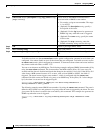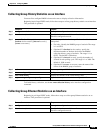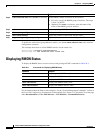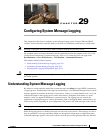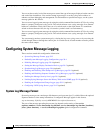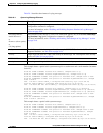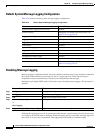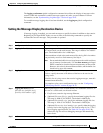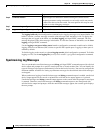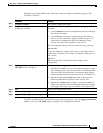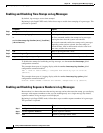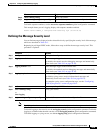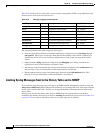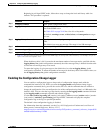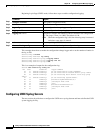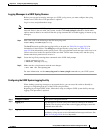
29-6
Catalyst 2960 and 2960-S Switch Software Configuration Guide
OL-8603-09
Chapter 29 Configuring System Message Logging
Configuring System Message Logging
The logging buffered global configuration command copies logging messages to an internal buffer. The
buffer is circular, so newer messages overwrite older messages after the buffer is full. To display the
messages that are logged in the buffer, use the show logging privileged EXEC command. The first
message displayed is the oldest message in the buffer. To clear the contents of the buffer, use the clear
logging privileged EXEC command.
Use the logging event power-inline-status interface configuration command to enable and to disable
logging of Power over Ethernet (PoE) events on specific PoE-capable ports. Logging on these ports is
enabled by default.
To disable logging to the console, use the no logging console global configuration command. To disable
logging to a file, use the no logging file [severity-level-number | type] global configuration command.
Synchronizing Log Messages
You can synchronize unsolicited messages and debug privileged EXEC command output with solicited
device output and prompts for a specific console port line or virtual terminal line. You can identify the
types of messages to be output asynchronously based on the level of severity. You can also configure the
maximum number of buffers for storing asynchronous messages for the terminal after which messages
are dropped.
When synchronous logging of unsolicited messages and debug command output is enabled, unsolicited
device output appears on the console or printed after solicited device output appears or is printed.
Unsolicited messages and debug command output appears on the console after the prompt for user input
is returned. Therefore, unsolicited messages and debug command output are not interspersed with
solicited device output and prompts. After the unsolicited messages appear, the console again displays
the user prompt.
Step 6
terminal monitor Log messages to a nonconsole terminal during the current session.
Terminal parameter-setting commands are set locally and do not remain
in effect after the session has ended. You must perform this step for each
session to see the debugging messages.
Step 7
show running-config Verify your entries.
Step 8
copy running-config startup-config (Optional) Save your entries in the configuration file.
Command Purpose



